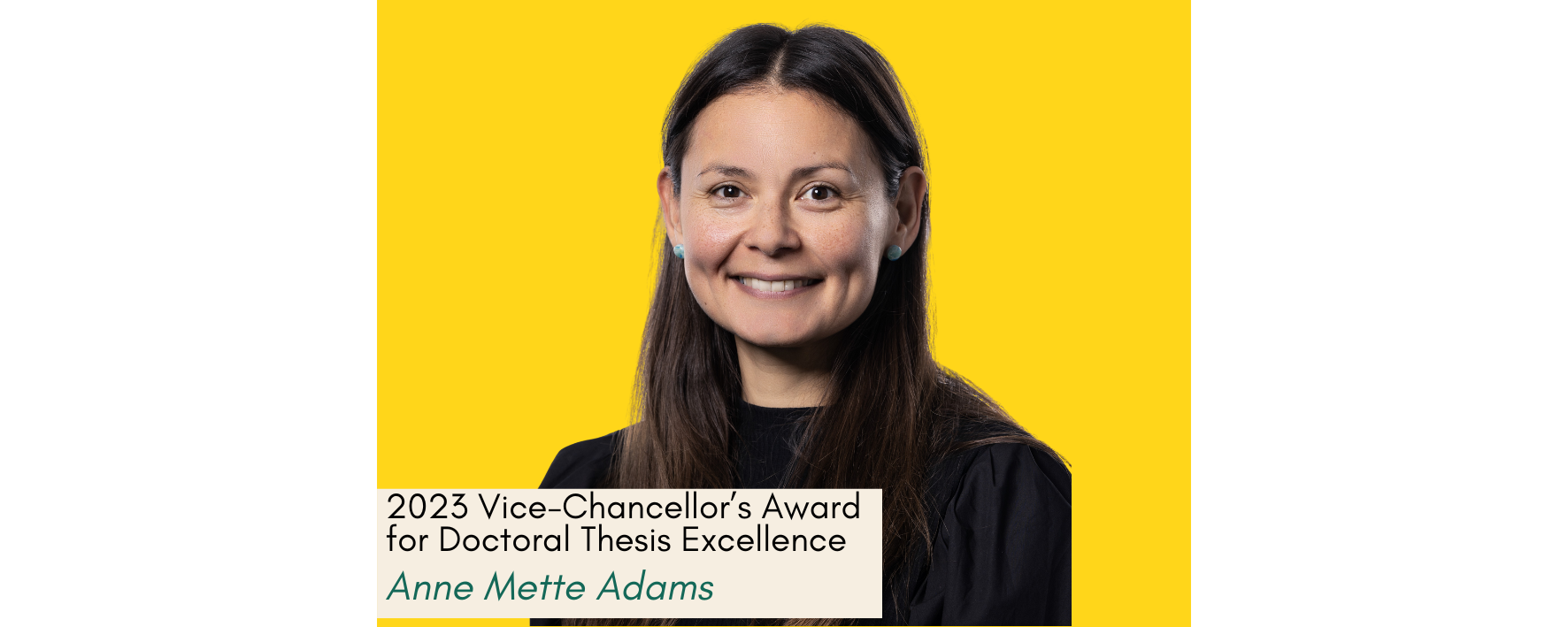
Anne Mette Adams is from the College of Nursing and Health Sciences and is one of the 12 winners of the Vice-Chancellor’s Award for Doctoral Thesis Excellence for 2023. Anne was supervised by Professor Tiffany Conroy and Professor Diane Chamberlain from Flinders University, and Professor Mette Grønkjær and Dr Charlotte Brun Thorup from Aalborg University in Denmark.
Mette’s thesis aimed to develop preliminary clinical practice guidelines for the non-drug management of patient agitation in Danish and Australian intensive care units. Over three study phases it identified a set of recommendations establishing a new model of care. Additionally, the study highlighted the benefits of collaborating with stakeholders across countries and provides practical advice on how this can be done in ethical and rigorous ways.
We invited Mette to share insights into the PhD journey and what winning this award means.
![]()
What does winning the Vice-Chancellors Award for Doctoral Thesis Excellence mean to you?
Life as a researcher, a teacher and a mum can be incredibly hectic, so much so that at times, we forget to stop and celebrate our achievements. For me, this award is a great reminder that my research is valued and important. It recognises the hard work I dedicated to my PhD while also reflecting the amazing support I received from my international supervisory team
![]()
What led you to undertake a PhD? What inspired or motivated you?
It was a decade of working as a nurse in intensive care units across different countries that inspired me to commence the project. During this time, I observed broad practice variations in how patient agitation was addressed. Not only did practices differ between countries, but also between institutions and clinicians. I witnessed first-hand the toll it took on staff – I saw their exhaustion and frustrations when they were unable to reduce agitated behaviours and when they felt unsafe and unsupported. I also noticed instances of inappropriate application of physical restraints and an overuse of sedation. While medication can be crucial for ensuring the safety of patients and staff, it is important to recognise the significant side effects associated with it. Therefore, nurses should use effective non-drug strategies whenever possible. Not knowing how to best care for these patients in patient-centred ways can lead to moral distress and negatively affect our willingness to work in the ICU. It made sense to me to develop guidelines, a toolbox really, with non-drug strategies to effectively reduce agitated behaviours.
What are your future goals and plans? / Where do you see your career heading in the future?
One of the things I love about having completed my PhD is that I get to work in teams and discuss research with like-minded colleagues. It is exciting to discuss what care is and how it can be measured, as well as explore avenues for improving care delivery. In a time with high levels of nurse burnout and retention challenges, it is particularly interesting to discuss how leadership teams can better support their staff.
So, while I discuss care with my colleagues and advance research on the fundamentals of care, my PhD project also continues. Recently, I received funding to finalise and publish the guidelines in both Denmark and Australia. Looking ahead, I’m hoping the guidelines will be successfully implemented into practice and change the way we provide and perceive care in the ICU.
In my current role, I also enjoy working with senior researchers, supervising Master’s and PhD students and supporting them on their journeys towards a PhD. After years of studying, it feels good to share the knowledge and skills I have learnt along the way. The dynamic nature of research ensures that I am continually learning and growing with each student encounter.
Finally, in my current role as a researcher and teacher at the College of Nursing and Health Sciences, I consider myself fortunate to be actively involved in shaping topics focusing on critical care, evidence-based practice and knowledge translation. Being able to combine my clinical experiences with research and teaching is really meaningful to me.
![]()
What advice would you give to current or prospective PhD students?
Embarking on a PhD journey is more than earning a prestigious title and opportunities for promotion. It is about undertaking a program that equips you with the skills you need to discover new and original knowledge in rigorous ways, ultimately enabling you to make real changes in people’s lives. My advice to students is to embrace the journey and seek every opportunity you can to learn and grow.
Personally, I found that getting up early before the kids was extremely beneficial – and in fact, it still is. The hours with no interruptions, give me the quiet time I needed for deep thinking and writing.
If you can, treat your PhD as a full-time job. Your PhD is not you and it does not need to be your life. Set clear boundaries between family life and work.
My last advice is to get out of the house – for a walk or run – every day. Getting out in nature really helped my thinking and my mood. If you struggle to fit in the exercise, then listen to an important webinar, podcast or meeting while you go for a walk.


